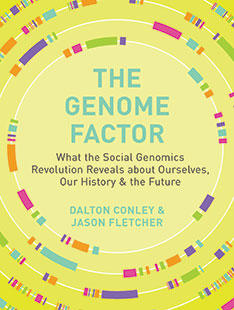For Dalton Conley, the Henry Putnam University Professor of Sociology, the nature-versus-nurture debate is dead. “There is almost no human outcome you can measure that doesn’t have both a genetic and an environmental component. Even something like height is influenced by both,” says Conley.

Conley and co-author Jason Fletcher, a public-affairs professor at the University of Wisconsin–Madison, discuss how genetics is transforming sociological topics in their new book, The Genome Factor: What the Social Genomics Revolution Reveals about Ourselves, Our History, and the Future (Princeton University Press).
Conley spoke to PAW about the unexpected results that emerge when genetics is incorporated into topics such as race, reproduction, education, and marriage. The ultimate goal is to understand genotype — a person’s genetic makeup — as “a prism that refracts the white light of our environment,” says Conley.
It’s now as easy as buying a mail-order DNA kit to glimpse into one’s genetics. What are the consequences of having this information?
There are psychological consequences to finding out your health information, what disorders you may be predisposed to, for example. Learning that you carry a genetic risk for developing dementia, heart disease, or some other disease may profoundly affect your psychological state of well-being and your behaviors. These analyses can also tell you what your full height potential is and [serve as] a proxy for your cognitive abilities.
“Learning that you carry a genetic risk for developing dementia, heart disease, or some other disease may profoundly affect your psychological state of well-being and your behaviors.”
Dalton Conley, professor of sociology
For adults, it’s a bit late, but if we sequence kids’ genomes, there are a lot of questions of how we should or should not use that kind of information. One of my jobs as a social and biological scientist is to try to show that it’s not as simple as putting your DNA code, [your genotype] into a machine and ending up with a phenotype — an observable characteristic. Almost every outcome from food preference to cognitive ability to body mass index has a genetic but also a significant environmental component. To have a complete picture of human society and behavior, we need to show that there is a genetic component to social behaviors, but also understand how our environment mediates and moderates our genetic makeup.
How can genetics influence social policy?
There are what we call “orchids,” people who are very influenced by their environment, either positively or negatively; and there are “dandelions,” those who are not likely to be affected by [their] environments. By incorporating genetics, we can describe the world better and we can begin to think about individually targeted interventions for social policies in the way that clinicians think about personalized medicine.
The book also delves into how difficult it is to define race.
Race is a challenging issue. The extreme view [is] that race is entirely a social construct, which I think is untenable — there are human genetic differences that cluster by geographic origin and ancestry, and we can see that in the genome. On the other hand, the genetic portrait of what we call continental ancestry belies what we call race around the world. We now know from genetic studies that East Asians and whites are genetic neighbors, even though we think of these as two distinct races; there are huge genetic differences among sub-Saharan African populations, and yet we tend to treat people of African descent as one group. There are challenges with these new data because it’s hard to get away from our phenotypic biases. Perhaps race will someday shift to a more genetic definition.
Interview conducted and condensed by Anna Azvolinsky *09












No responses yet